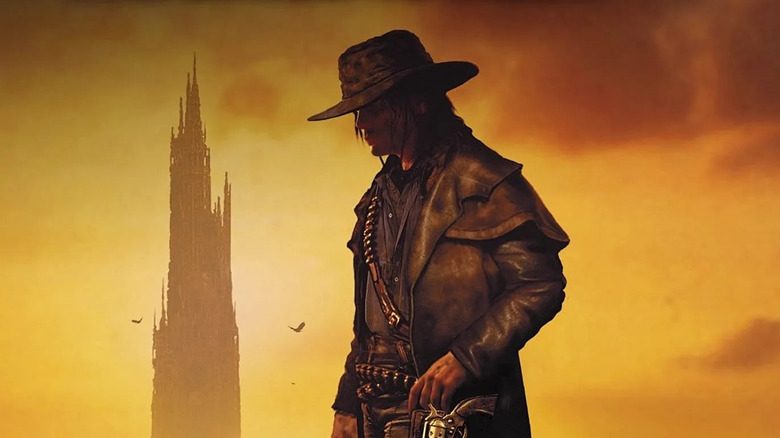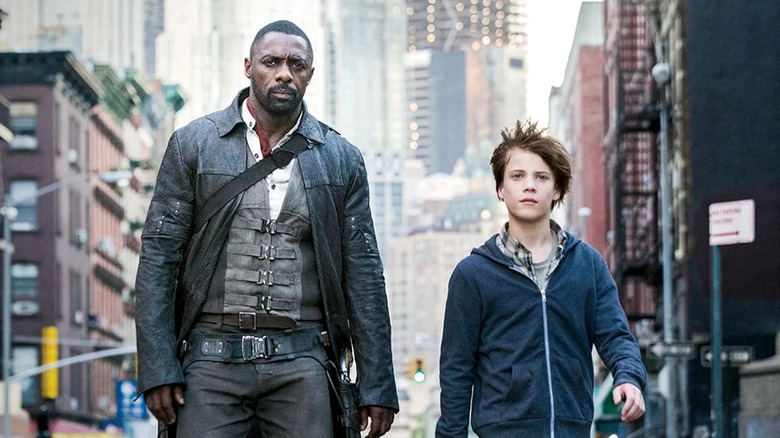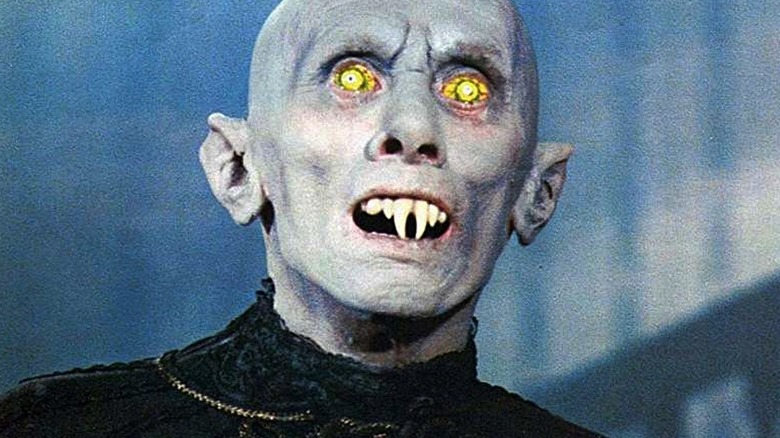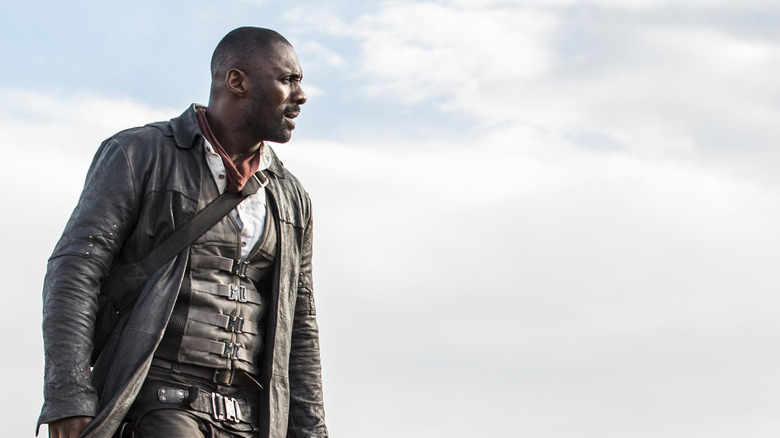What We Want To See In Mike Flanagan's Dark Tower Adaptation
It's a good day for "Dark Tower" fans. Mike Flanagan and Trevor Macy, the director and producer who are responsible for Stephen King adaptations like "Doctor Sleep" and "Gerald's Game," have just announced that they've got an adaptation of "The Dark Tower" in the works. Fans who remember that 2017 movie might be skeptical, but don't worry: that was made by a different team, and this time Flanagan and Macy will be adapting the series through TV, not film. According to their early plans, Flanagan and Macy are planning for the show "to run for five seasons, followed by two stand-alone features."
Consider the overall structure of King's seven-book series (which blends fantasy, horror, science fiction, and westerns): a relatively short opening novel and a giant flashback sequence in book 4. Yep, five seasons seems like the perfect length. It's also encouraging that this has been Flanagan and Macy's dream project for a long time. It's also clear from their previous adaptations of King's works that they both fully appreciate what readers like about the horror maestro's stories in the first place, and they'll certainly try their best to stay true to that.
Season 1 of this new "Dark Tower" adaptation is still a long way off at this point — remember, this wouldn't be the first time a "Dark Tower" adaptation got scrapped before it ever aired — but for fans who've been waiting for decades for something like this, there's more reason to be excited than ever. So, as we wait for "The Dark Tower" to maybe hit our screens in 2025 or whenever, it's worth reflecting on what we hope to see in it.
The timelines unaltered
In the 2017 film, Jake Chambers (Tom Taylor) starts off living in a modern day, 2017 version of New York City. In the books, meanwhile, 11-year-old Jake is living in the '70s. The time Jake grows up in is reflected in his personality, the slang he uses, his perspective on the world, and it gives him an opportunity to interact with a younger version of key character Eddie (who we first meet as an adult in the '87) in the third book, "The Waste Lands."
Updating the source material to modern times is hardly a new thing. Both of the recent "It" movies moved the story forward a generation, so the kids would meet up in the '80s and reunite in the audience's modern day. There are ups and downs to this approach, but for "The Dark Tower" series it would be mostly downs.
Yes, having Jake be introduced in the modern day would make him slightly more relatable to modern viewers, but for him and Eddie and Susannah, the specific decades they come from are major, unavoidable aspects of their characters. One of the best parts of the books is how much the writing embraces the period each character grows up in, with their storylines reflecting details of historical fiction even when the character is someone like Eddie, whose timeline the initial audience's modern day in "The Drawing of the Three."
"The Dark Tower" series doesn't need to be 100% faithful to be a good show, but it'd be disappointing if they didn't have Jake, Eddie, and Susannah start off living in the '70s, '80s and '60s respectively. Let's hope the show trusts its audience to still be capable of connecting with their characters, even if these characters still don't know what the internet is.
Getting meta with the movies
One of the coolest things about "The Dark Tower" series is how connected they are with the other Stephen King novels. A main character from "Salem's Lot" pops up in the beginning of the fifth book, and he plays a major role in the series going forward. (That's why it's important to read the other King books first before starting "The Dark Tower" series.) The references to other King novels increase until the end of the fifth book, when the characters find a literal Stephen King paperback and the characters are forced to wonder if they're even real or not. (The meta aspect only gets weirder from there.)
Because this adaptation is on a visual medium, it might be more interesting if the series leans into referencing other King adaptations even more than the books themselves. Admittedly, this gets a little confusing: the characters wondering if they're on a TV show somehow makes less sense than the characters wondering if they're book characters (but honestly, the latter doesn't make a ton of literal sense either).
Whatever happens, the show will hopefully take full advantage of the many actors from previous King works. There's a Salem's Lot movie coming out soon, with John Benjamin Hickey playing Father Callahan. Maybe the show will be able to get that specific actor back to play the part again. And with Flanagan and Macy having made "Doctor Sleep" and "Gerald's Game," maybe they'll find a way to let some of those characters make an appearance in "The Dark Tower" as well. Those two novels were never referenced much in the "Dark Tower" books, but it'd be cool for the show to try to squeeze them in anyway.
A genuinely cold Roland
One problem often seen with modern adaptations of older works is a reluctance to embrace the uglier sides of the main characters. The recent "Sandman" adaptation seemed to particularly struggle with this: the Morpheus of the comics ends his first ever issue in the series by casually sentencing a man to eternal mental torture; in the show, he just puts the guy into a coma. It almost feels like the show's afraid of having Morpheus appear like too much of an unlikeable jerk, even though Morpheus is supposed to be an unlikeable jerk sometimes.
Similarly, Roland at the beginning of "Dark Tower" books is sort of a terrible dude, and the books never shy away from that. He's absolutely obsessed with getting to the Dark Tower, to the point where he will let a little boy fall to his death. Roland's coldness is a massive part of his character — the whole series is basically about him learning to open up again, rediscovering his old humanity — and it works precisely because of how unsympathetic and distant Roland is at the start.
It's easy to imagine a version of the show where the showrunners try to downplay Roland's selfishness in order to make him more palatable to general audiences, but to do so would be a disservice to Roland's long-term character arc, which is one of the best arcs that Stephen King has ever written for any of his characters.
Of course, "The Dark Tower" is an almost absurdly difficult book series to adapt into any medium, so even if this new attempt flops, Flanagan and Macy deserve props for trying. But as long as they keep these three elements in mind, we're probably going to have a good time.



